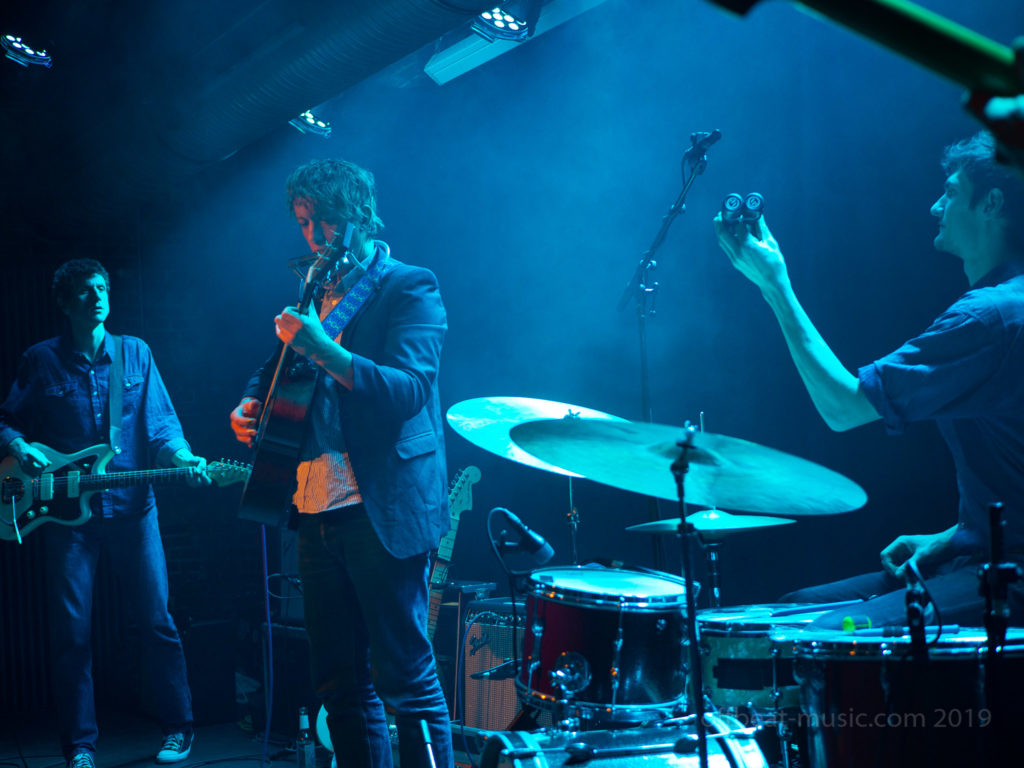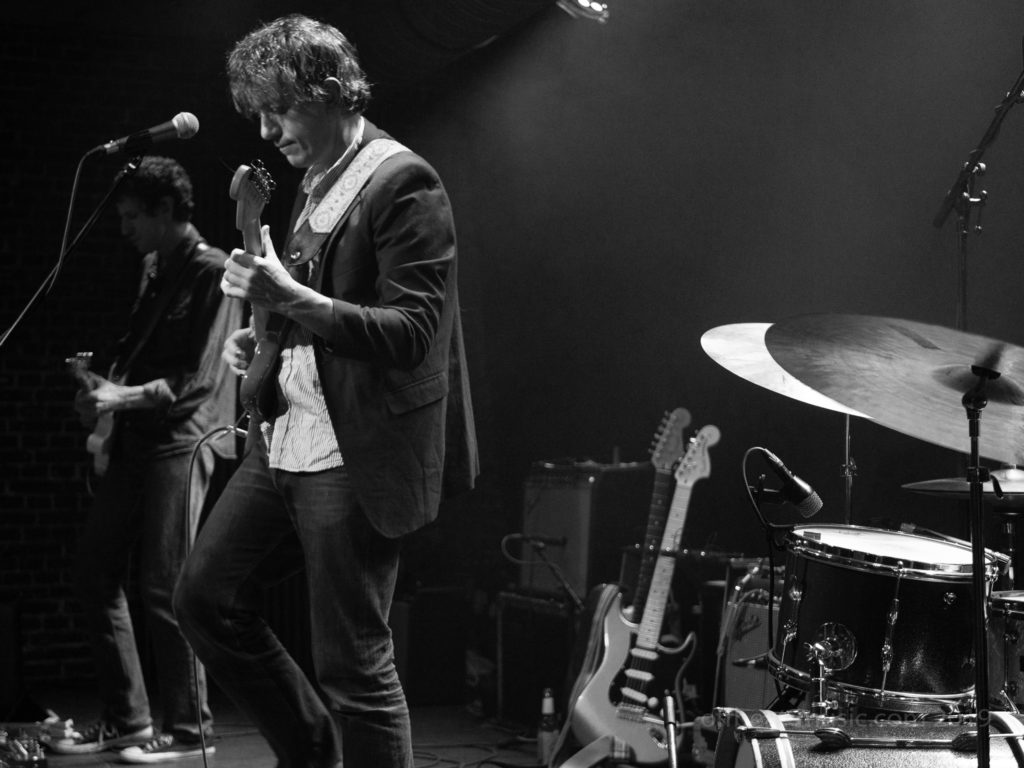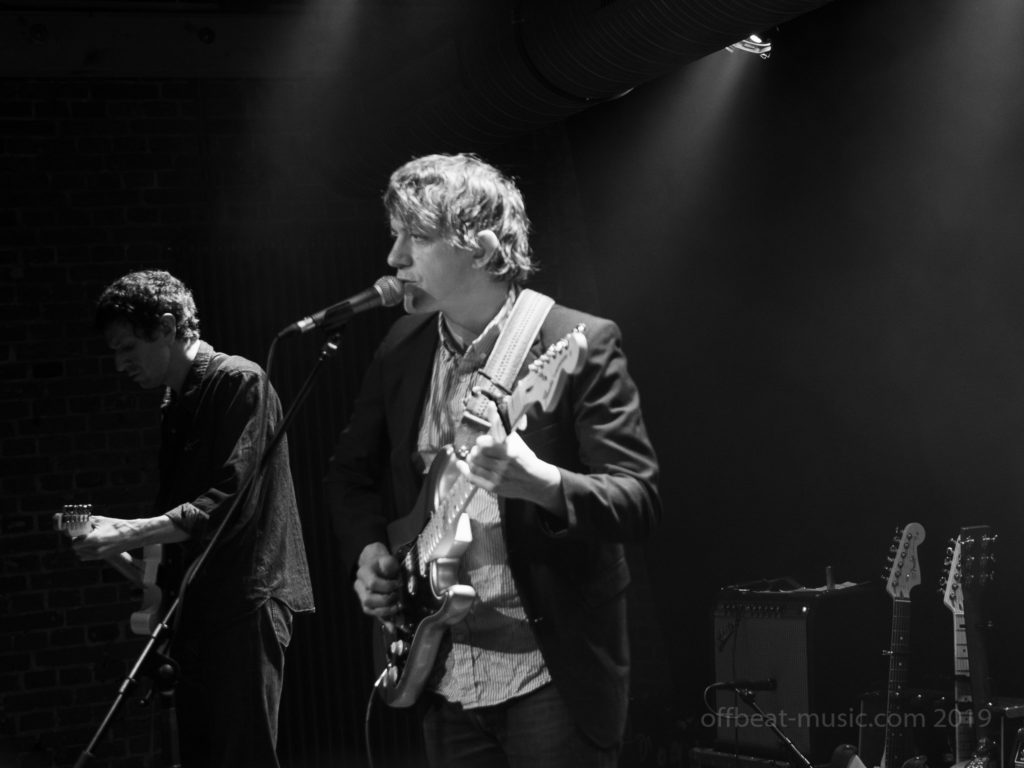As you might deduce from this blog and also from my radio shows, I have been listening to Steve Gunn for quite a while and hence eagerly anticipated his new album “The Unseen In Between” (Matador). The sheer multitude of Steve’s outputs, collaborations, musical interests and the scope of his guitar playing as well as his dedication to music is second to none.
When I heard the first few songs of Steve Gunn’s new album, I was amazed at how lush they sounded and still intimate, how light and yet bittersweet, how much he has managed to find his voice, both literally and in his lyrics, his probably most personal, yet leaving room for your own reflection. Do yourself a favour and make that new album a companion on your way into spring and summer and also do not miss your chance to see Steve Gunn introduce “The Unseen In Between” live. Songs of the new album and a well-chosen array of older material were also presented by Steve and his immaculate touring band on February, 15th at Nochtspeicher in Hamburg, Germany, which I could gladly attend.
Also, yet again, Steve Gunn took time out between soundcheck and dinner to talk. Considering the wealth of music and musical interests, Steve has to offer, those interviews could last forever (and Steve would even be too polite to cut them short) but still, this is a huge one but I hope you enjoy it reading it until the very end. If you would like to check out older interviews with Steve, find them here and here.
 Interview with Steve Gunn on the “The Unseen In Between” Tour at Nochtspeicher, Hamburg, Germany, February 15th, 2019
Interview with Steve Gunn on the “The Unseen In Between” Tour at Nochtspeicher, Hamburg, Germany, February 15th, 2019
Offbeat Music Blog: So thank you, Steve, for taking the time!
Steve Gunn: Sure!
OMB: You’re looking well and relaxed.
Steve: (laughs) Thank you! It’s early on the tour, it’s day four, so I’m feeling pretty good.
OMB: The new album “The Unseen In Between” (Matador) turned out to be a beauty.
Steve: Thank you so much!
OMB: The last time we met, that was just in between the passing of your father and the election…
Steve: Oh my gosh, yeah…
OMB: …of what shouldn’t be called the President of the US but it is.
Steve: Yeah, oh, what a weird time that was.
OMB: It was a crazy time.
Steve: It is funny to think that was almost four years ago, I mean three years ago, I guess.
OMB: I think so, yeah, three almost. But then you had still a busy time: You went on tour with Lee Ranaldo.
Steve: I did, yeah.
OBM: But I think, you took a break then, didn’t you?
Steve: I did. I took a break probably shortly after we spoke, after that tour. I remember the last night. We were in Manchester and it was the last show of the tour. And it was rainy. And the election had happened. And we all flew our separate ways. And that was it. It was in the end like the closing of a book almost. Then I was home for a few months and I had been thinking about all these songs and had all these ideas and when I got home I closed the door on the touring and the past album and started a totally new project, like buying a new notebook sort of thing (laughs).
I have a rehearsal space in Brooklyn and I really kept a schedule. I’d never really done that before. But I had all these feelings and things floating around my head and had no real channel to get them out. So I was going to my rehearsal space every day for the whole day, basically.
OMB: Sort of forcing it out?
Steve: Yeah. I think, before, I was always relying on inspiration to visit me and this time I was trying to summon it, I suppose. And learning about writers and poets or artists. I think that the really good ones and the ones that you think, perhaps, they’re just pulling this stuff out of thin air: It actually takes a lot of work and a lot of discipline and I felt like I wanted to try that a little harder and rely on it a little more?
So even if I wasn’t working or rather if I wasn’t coming up with anything, I still considered it important to be doing it. It actually took a long time for me to come up with some of the songs but you know, I think it was all that time and work that I had been playing and editing and thinking, just being alone. It really was just a different way to work and it felt like it was rewarding.
 OMB: So, you collected the songs over some time. Did you think they fitted into one kind of framework?
OMB: So, you collected the songs over some time. Did you think they fitted into one kind of framework?
Steve: You mean like just one whole big vision?
OMB: Yeah.
Steve: A little bit. Well, production wise, I had been talking to a few people, but I was on the road – I always mention him when we speak – with James Elkington – we were on the road together. And he’s my very close friend and almost confidante where I ask him about what I should do, or how I should approach things. And he’s very smart, and he has so much experience. He’s also very pragmatic and I always value his advice. So, we were talking quite a bit about this new record. And, you know, we were coming up with this plan as we were talking, and then I realised – after visiting all these studios and speaking to a few producers – that I’m not that kind of a musician. I didn’t really want to have a producer. I already knew I can trust all the stuff with my close friends. James, for instance, he just knows how I work and I think there’s a shorthand involved and I thought it would be really cool to hand over the production part of it to him. Not so much the engineering part, but navigating the songs, knowing the arrangements, knowing where I’m coming from.
OMB: Because he knows what you are getting at?
Steve: Yeah and also, we just talk about music all day and gear and we had everything kind of figured out within a few hours of talking and I think with another person or giving up certain artistic control to a producer… not to say that it wouldn’t be its own thing or be great in its own respect…but I didn’t want to give these ideas up to someone who might not necessarily know how to facilitate them.
OMB: It could have gone wrong.
Steve: Yeah, and it just made everything so easy because one of the main topics that we discussed was to reduce everything and to do it more simple and there don’t have to be like seven things going on at once, so it can just be your guitar and your vocals and just
sort of simple ideas. We kept talking about those kinds of things and we came up with this very simple plan.
I visited this really amazing studio in New York. And it all just sort of aligned itself in this cool way. And then in the studio, I became friendly with the engineer. He was like “Hey, I have Bob Dylan’s bass player in here today, he was working on a session with some other people. And, you know, he really likes the studio”, the engineer was saying. “Tony’s really hitting it off well, and he was wondering what was going on in the studio. I told him you were coming in here and he was interested and he heard some of the demos and…”
Meanwhile he’s telling me all this and I’m slightly freaking out like “oh my gosh”, because Jim and I were just going to do the bass stuff and figure it out but it just so happened that a week before, Tony, Tony Garnier is his name, was interested in coming and even just playing for one day and seeing how it went. And it turned out, he walked in and we all just became fast friends and hit it off immediately. He was having such a great time. We were just so thrilled to have him there. Jim and I and also the drummer, this guy, TJ, Tony kind of just saw something really interesting going on. And I think it felt, you know, somewhat refreshing for him to see some younger guys trying to approach an album almost in a kind of a way that is almost lost. Recording, where you have a room and you’re trying to get a live room sound and you want to have a presence of the band actually playing.
OMB: Also like a jamming thing?
Steve: Yeah. I imagine, Jim and I talked about this endlessly. Like you have these session musicians, almost like the group called The Wrecking Crew which was Hal Blaine who was the drummer who just passed away and a bunch of other musicians. They are so accomplished, they can walk in and support a guy coming in or someone coming in with songs where they don’t have to rehearse so much. Just get a feel for it, do a couple takes…It’s what we were trying to go for.
Jim had the bass arrangements ready so he could transfer them to Tony and yeah, we just sort of went from there and we were doing stuff really on the fly. What was cool was, Tony decided to stay for the whole session and he became invested in it and he was very encouraging to me. Because, you know, there are so many different ways you can make an album. His whole thing was´(and I really think, he gets this from playing with Bob Dylan so much): “Just go in there and sing your song. There’s nothing else to it. You know, just be yourself.” He instilled this different sense of being present and being confident and not worrying about it.
OMB: You do sound as if you are becoming more confident about the singing, just letting go?
Steve: Yeah, it was almost like a cathartic sort of thing for me. Well, I also remembered when I did this album before (“Eyes On The Lines”) and there was a lot of pressure and it was rushed. Now there was a lot going on and I just felt like I didn’t have anything to lose. And I had some things to say and I really just let myself go a bit. Yeah, it felt so easy. I felt as if we had been building up to it and all the discussions and all those days of me going to my rehearsal space and all the editing and working on the words as much as I could and going over it two, three, four, five, six, seven times and getting it right and revising stuff… I think, well there were also other things that just kind of came up very quickly and then that was it and then we moved on. Like for instance the song “Morning Has Mended”: I wrote it very fast and I went and recorded it in one day and then we moved on.
 OMB: It does have a light touch to it, the album. Maybe what pop songs in the original meaning should sound like. Maybe you keep the more experimental ideas now to, say, your collaboration with John Truscinski?
OMB: It does have a light touch to it, the album. Maybe what pop songs in the original meaning should sound like. Maybe you keep the more experimental ideas now to, say, your collaboration with John Truscinski?
Steve: Yeah, John and I are still playing a ton and we worked on a film soundtrack. And we played with Kim Gordon for another soundtrack as well. We are performing that this summer with her and another guitar player named Bill Nace.
So John and i are still very engaged with what we do and yeah, I think, I’d like to have those things separated a bit. I really have changed as a songwriter and there are certain things I’m doing now that I wouldn’t really have imagined myself doing in the past, just really knowing a bit more about songwriting. I don’t know, it just it took me so long to come to realise how you can write a song. And there’s a simplicity that is not easy to do. But some of my favourite songs are just so simple.
OMB: They sound simple but that’s probably the most difficult thing to do.
Steve: That’s what I mean. Some of the best songs, my favourite Velvet Underground songs, are just a few chords. So for me, it took me so long. I think one reason was that when I was learning how to play guitar, I really kind of jumped into this virtuosic approach.
OMB: And you put a lot of time and effort in it.
Steve: I put a lot of time into it. So it’s hard for me to pull back and just play a 1, 4, 5 chord progression in a major key you know, and this time I don’t know, I just was like, why not?
OMB: Maybe you realised it’s not beneath you…
Steve: Yeah (laughs).
OMB:…and it actually turns out to be a good song and it is not easy to write a simple song.
Steve: Yeah, right! And it’s interesting to know and to hear people speak about what kind of musician they are, and what kind of parameters you can put around what you can do. And there’s another side to it as well: If I’m a musician only doing improvisation and droney noise stuff, I think that would be quite boring for me because I really like the challenge of trying to construct something within a formula and, and mixing it as well as improvising. I can’t do everything but for me that’s something that I enjoy you know. I wouldn’t want to just do one thing but they all correlate.
OMB: Do you feel that after you’ve learned so much that you have all these techniques at hand and you can play with them without even thinking about it, it just gels?
Steve: Yeah, I think so.
OMB: You don’t have to consciously strive for something. You just have the tools there and you go ahead.
Steve: I think also – I mean, you’ve seen me play before – but tonight as well,…The album ist very straight but there are certain things we’re feeling out on stage. And I use a lot of those tools where I let go at certain points. And, whether it’s this kind of stuff or the other things, I really have to get into it mentally. I can’t just go up there and “la la la”, just do it. It’s something that I internally have really encompass into myself and get in a meditative sort of state to make it work. To connect with the other players – we’re all similar in that way.
 OMB: You were saying at the time that once you started singing, you had to kind of delegate the guitar work a bit. And that that was hard for you in the beginning. How does it feel now?
OMB: You were saying at the time that once you started singing, you had to kind of delegate the guitar work a bit. And that that was hard for you in the beginning. How does it feel now?
Steve: Yeah, really hard. it’s interesting, because that’s another point with the album, this new one, where I was thinking about these simple songs that are so inspiring to me. And I think there’s so much more to it than just guitar, bass, drums, whatever. It really comes down to the singing and the vocal delivery and the words, and for me, that’s really what I felt was important and what I concentrated on and I wanted to improve as a singer and I wanted to be comfortable and I worked on it.
It’s actually funny because with these new songs and me trying to sing more and sing better and the songs are a bit simpler and I’m like, Oh my gosh, this is easy! It’s not a walk in the park by any means. But before I was doing all this complicated stuff and singing over it and I’ve sort of matured a bit in that respect and taken a step back.
OMB: You have Meg Baird singing on the album as well?
Steve: Yeah, that was really really great to finally collaborate with her. She’s someone who I’ve admired since I was still practicing and before I was ever performing, you know.
OMB: You’re a person who wouldn’t want to write confessional songs? Not in the Joni Mitchell kind of sense since you find that people would not be interested. Still, that album seems as personal as it probably could get for you with having a tribute to your father or a song about your father. And was that a one off? Or would you think you’re happy enough now to write more personal stuff?
Steve: Yeah, I think it’s a new, I wouldn’t call it direction, a new topic for me or just a new subject or a new approach.
OMB: It is still pretty abstract. People would still be able to project their own thing onto the songs.
Steve: Right, right. I really think it’s important just for me to have that kind of universality like a not so overly personal song where I am singing about my own experience specifically where it’s some sort of historical time frame of my own life. But at the same time there are certain songs like “Stonehurst Cowboy” where it was a song I knew I wanted to write as a tribute to my Dad. I’m also thinking about the people who are listening. And I mean, that’s all part of life, the experience that I had. And I’m reflecting on that.
Thinking about my father’s story. I think that, particularly my Dad and his peers and his family went through a really strange, hard time and made lives for themselves. You know, I mean, I’m no psychologist by any means, but to get the full story and to come full circle with his life and to have him ill and dying essentially, and have him with me was this really almost beautiful, sad but beautiful kind of experience. And I really value this because a lot of people don’t have this opportunity. But I valued this time with him because I think that there is a lot of things that I wanted to figure out. I didn’t, of course, figure it all out. I carved my own path as an artist. And he was, you know, working class, a very poor kid. He and all of his friends were sent overseas and were in this senseless war. And all of them struggled with their own battles, with all kinds of different things. And there’s a lot of unspoken kind of pain. I think that comes along with families who’ve been at war, whether it’s parents, grandparents, and there’s a lot of undiscussed things and a lot of embedded psychoses. People deal with it in different ways.
Then I got more interested in that as I got older and I got more interested in his story. I understood the parameters of his experience a bit more just reading about it and learning about what actually happened. And the fact to have a firsthand source of the experience. It’s not something he wanted to talk about, but it was a part of his life. It’s part of my life as part of my family, my mom’s, my sister’s. So I thought it was important to really pay tribute to him in a way that other people can relate to.
One thing that I really value the most in doing this: Having people to use the music for any kind of comfort or whatever they want to use it for and to give that to the world is important. I don’t want to take anything. I don’t want to say, here’s me and my new suit. Look at me, I look so cool. That’s not why I’m doing this. You know, for me, it’s, I think about people listening because this is what music does for me. And I’ve grown up using it as a tool. And it’s helped me in my life. And I feel like if I’m going to have a platform and do it, that’s how I want to be looked at. And that’s how I want to be interpreted. And some people use music for other reasons…
OMB: Some background…some dancing.
Steve: Yeah, and that’s fine, too. I mean, I do it as well. We were talking about experimental music. I love that stuff too. But do I want to play feedback and Indian like guitar skills and make records like that forever? I like telling a story. And I like the mystery of language. And I like playing with those kinds of things. And I like painting. I’m not a painter and not a filmmaker, but I like creating this imagery with words.
OMB: Words are a very powerful instrument, also to create an atmosphere.
Steve: Yeah. I’m inspired by people, particularly poets and artists and painters who are giving something else to people.
 OMB: You wrote an introduction to a reissue of “The Words In Between” by Dave Evans on Earth Recordings. Listening to the title track in particular I was was thinking about you and thought how proper spooky that was that you used words on your album more than ever and called it “The Unseen In Between” and it was released shortly after the reissue of “The Words In Between” by an artist you really love.
OMB: You wrote an introduction to a reissue of “The Words In Between” by Dave Evans on Earth Recordings. Listening to the title track in particular I was was thinking about you and thought how proper spooky that was that you used words on your album more than ever and called it “The Unseen In Between” and it was released shortly after the reissue of “The Words In Between” by an artist you really love.
Steve: It is interesting you caught that. I was definitely inspired by him and by that record and I really love that title. I think it’s somehow just stuck in my head.
OMB: I had never heard of him before. You have a knack for really finding a lot of music .
Steve: That was an album where I go to record fairs and I talk to people who are record collectors and that was always one where they went: Hey, have you heard that record by Dave Evans? Also, getting to know some of the older players like Michael Chapman and Mike Cooper and …(oh, I am drawing a blank, he shares the same name as your man from Jethro Tull and is a friend, unbelievable)…of course: Ian Anderson is a musician who lives in Bristol and in the early
60s did the kind of blues or revising around England where he was playing folk music and was interested in the blues players. And he and Michael Chapman knew each other, and also Mike Cooper, they’re all around the same age. Ian Anderson had a label back in the 60s and put his own albums out which were really, really great. So, and then the label’s called The Village Thing, and it’s all more regional homegrown folk stuff, almost similar to Pentangle or more higher end folk musicians, but with their own kind of aesthetic and it was a community of musicians called the village thing and basically all these people lived around there. Dave Evans was and Ian put his album out. That was his first album. And he was quite an accomplished guitar player and he made his own guitars. Really interesting guy. He still lives. He lives in Belgium. I don’t know if he performs very much and he works in a guitar store. A very interesting character. The album is beautiful. I made friends with Ian Anderson in Bristol and we were just talking about all this stuff. Then Earth Recordings approached me to write something after I had written about an Anderson album and said they were going to reissue. I said “Oh my gosh, I’d be honoured.”
OMB: You also went to Wales to produce Michael Chapman’s new album “True North” which again is like a tribute to where he comes from, his upbringing?
 Steve: Yeah, it was interesting to do that with him and quite rewarding. I also was honoured that he asked me again to do it and I felt like there’s something about Michael that’s so magical when he’s just sitting in a room playing for people. To me, he had gotten newly inspired and he had been writing all these great songs. We were trying to figure out what songs to do. And he had some older material and I went to his place, his house in England first, and we hung out for a day or two and picked the songs to work on. And then we drove down to Wales, and I really just wanted him to be comfortable and to play and sing at the same time and bring the people that he’s been playing with for a long time. The album’s got BJ Cole who has been playing with Michael since the 70s. And he is just an incredible pedal steel player. Sarah Smout is a cellist that has known Michael since she was a child and her father is basically Michael’s manager. Kind of all in the family and also Bridget St. John was there, one of Michael’s dearest friends, and I’ve gotten to know her as well and it was just very, very intimate amid a super beautiful landscape in this really lovely place.
Steve: Yeah, it was interesting to do that with him and quite rewarding. I also was honoured that he asked me again to do it and I felt like there’s something about Michael that’s so magical when he’s just sitting in a room playing for people. To me, he had gotten newly inspired and he had been writing all these great songs. We were trying to figure out what songs to do. And he had some older material and I went to his place, his house in England first, and we hung out for a day or two and picked the songs to work on. And then we drove down to Wales, and I really just wanted him to be comfortable and to play and sing at the same time and bring the people that he’s been playing with for a long time. The album’s got BJ Cole who has been playing with Michael since the 70s. And he is just an incredible pedal steel player. Sarah Smout is a cellist that has known Michael since she was a child and her father is basically Michael’s manager. Kind of all in the family and also Bridget St. John was there, one of Michael’s dearest friends, and I’ve gotten to know her as well and it was just very, very intimate amid a super beautiful landscape in this really lovely place.
I think it was a nice time in Michael’s life to do something that wasn’t in a studio with a bunch of people who want to play all over it but an engineer who was like just be yourself. Similar to what I was talking about with my last album. I was still in that kind of headspace. I wanted to capture just a very uncontrived, pure sense of what Michael is presently. He’s getting older and, you know, you can hear it in the album. But that’s kind of what makes it interesting.
OMB: The music on your new album “The Unseen In Between”, there seems to be definitely some influence from The Smiths there?
Steve: Yeah, for sure. Yeah. That comes from Jim, James Elkington, as well. I grew up listening to The Smiths and Johnny Marr, such an influential guitar player for me. And I remember reading about them, and learning about artists, even wondering, trying to decipher how Johnny Marr is layering these chords and how he’s arranging the songs. So because I listened to that stuff so much when I was younger, and then I shelved it a bit and then got into all this other stuff. And then later and later started revisiting it and talking to Jim and I found a new appreciation for The Smiths. Musically and guitar wise it was a really interesting combination of things that that band was doing. I was also saying that I’ve gotten a little bit more oriented with pop stylings.
OMB: Again, The Smiths probably sound very light. But it is very difficult to do. And also there’s this bittersweetness to it that suits your album very well.
Steve: Yeah, totally. It’s very sharp and biting a bit and it’s also a little bit vague and it’s very poetic but also sounds lush.
OMB: Lush, exactly, that was the first thing I thought when I heard your new album.
It does have quite a few layers but only where necessary. How are you able to reproduce that on a tour or are you finding your way around it or improvising?
Steve: It’s not easy. Finding my own way, yes. Yeah, I mean, luckily, I have a lot of great musicians that I play with. It’s a different thing, you know, of course, but we try to make it all work. It’s all part of the job where you have effects and you figure out the sounds and you listen to the album and say: “Okay, well, let’s try this part this way”, and sort of keep tweaking it and trying to get it right. And then also as we continue to play, and as I I often play with different people, sometimes it shifts around and moves around and lives in different ways, and I really like that. I love the performative aspect of it. So the album is the album. The songs I don’t necessarily want to play note for note as the album is and I like that kind of looseness to it. Obviously, it’s not that loose.
OMB: But it still has range to develop according to your development or your mood.
Steve: And yeah, it was great to have Meg. Meg was on tour with us in the States. That was really lovely to have her singing with me and she was playing keyboards. And I was like, whoa! Really filled it out a bit. You know, she was doing all this great textural stuff, so that was nice.
 OMB: You are used to playing with all sorts of musicians but this is like a completely new band you are going on tour with?
OMB: You are used to playing with all sorts of musicians but this is like a completely new band you are going on tour with?
Steve: Well, the two guys that I’ve played with here in Europe, I’ve been playing with them for a bunch of years now. Eric and Tommy.
OMB: All right, Tommy and Erik from Belgium.
Steve: Yeah. They’re always enlisted to be in the band and then learn the songs. Then the other guitar player Will is someone who I admired for years. He’s been in a few bands and I just asked him if he was interested and I gave him the time slots. It’s interesting because the people that I play with are doing different things, they play their own music, they play with a few other people. So I know it’s nice not to have to pull all the commitment from them.
So I like to be a bit more open about it. And I’m lucky to know some really great people who want to do it.
OMB: James Elkington is on tour with Jeff Tweedy.
Steve: Yeah. James is on tour with Jeff Tweedy. Can’t really bump him off of that (laughs). Maybe someday.
I admire Jeff so much. And all those people. Jim is a part of that community. And I’ve benefitted from that and gotten to know Nels and Jeff and those people and that kind of community and they’re all just really interesting and supportive.
OMB: But that’s probably the mark also of musicians who are not artificially made but have a craft and build a network, play with other people and get inspired by other people. Which is a good thing for the listeners as well, because that gets us to know other musicians as well.
Steve: Yeah, cool. Making the connections.
OMB: I don’t know if you read reviews?
Steve: Some, I kind of stopped.
OMB: Some are, possibly like myself, saying, this is a brilliant album and I like where he is going and I kind of knew that was coming and it is very well done. And others are: What’s with all the singing and where’s the guitar playing. I mean you can never please everybody but do you sometimes feel that people want you to do a certain thing and stick with it?
Steve: (laughs) I think so yeah. People want to hear certain things that I do and I’m doing all kind of different things. And they’re like, where’s your signature guitar playing? I’m like, that’s in there. And it’s all me.
It’s very strange being in the music business and having to put yourself out there in that way and having to adhere to certain things and be open to it and put yourself in almost not compromising positions. But maybe, you know, I’ve learned so much from working with Matador and they’ve been so supportive of me and what I want to do, but they also have their parameters as well. They make me work really hard and they were putting me back in the studio and had all these suggestions and actually they were right in the very end, but it was hard work, you know.
Being in a studio and thinking you’re done and you high five, and everybody in there, you’re thinking like I’m the fucking man, walking around, and then all of a sudden, I’m not.
OMB: Thinking, ah, that’s a burden off my shoulders.
Steve: Sure. Yeah, I’m just the best. – No, you’re not the best, get back in there and we need more material. – Really? Oh my god.
So that kind of stuff is very humbling. Also it made for a better album and and they know what they’re talking about. So it’s a different thing and, you know, for me, that’s fine.
OMB: But isn’t it very demotivating?
Steve: Yeah, but I mean, it’s great, they had a plan and I’m happy that they pushed me in that way, and I feel like they’re also satisfied. But to get back to the reviews. I have a hard time with them sometimes because I feel like I can tell when people are being lazy. I can tell when people are just grabbing things and they’re not making discretional decisions for themselves.There’s all these signposts saying “Okay, I’m going to write this review of this person. I’ve listened to the album twice. Okay. It’s not really my thing. But I googled him. Okay, he was in Kurt Vile’s band”. This kind of thing.
OMB: But your time in Kurt Vile’s band was such a short one and is so unrepresentative of what you do. It is just because people know Kurt Vile.
Steve: Yeah, that’s exactly what I mean. But some of the reviews are very thoughtful which I like. But sometimes l go: “This sucks. You’re not even giving it a chance. You’re not even really listening or no, you don’t know where I’m coming from and you’re just making these assumptions”. But I guess that’s what people do. I mean, I don’t expect everyone to know. But sometimes it feels like there’s these channels and there’s these trends going on within the indie world.
OMB: That’s what I was going to say. Especially for people in the indie scene – whenever you make something a bit more poppy sounding or moving to a bigger label, people assume it’s not hip or out there anymore, right?
Steve: Yeah, exactly. But I don’t harbour any bad feelings. And I get it. And I’ve learned to not really let it bother me. There were a couple of years, where I was just like, man…there was a pitchfork review and it was the worst review I’ve ever come across. There’s no depth to it. You could tell that this person didn’t really listen to the album, pulled things from my biography and maybe read a few most recent press pieces. Why were you assigned to do this? I sometimes think it’s just a bit harsh, you know, it’s like why would you do this? It’s just a bit disrespectful and thoughtless.
But at the same time, I don’t want to concentrate on the negative.
OMB: Exactly, you have to see where it is coming from. If someone is assigned to do this and merely sees it as a job or not. The reviews always have to be taken with a pinch of salt, I think.
Steve: Yeah, and I also think that there’s been some great, very thoughtful pieces as well, which I really admire. Like the one of John Mulvey.
OMB: Of course, of Mojo.
Steve: He wrote such a thoughtful review. He’s been following my stuff and kind of sees the progression and he contextualises it and it’s really beautiful. So I am grateful for these kind of responses.
OMB: Thank you very much, Steve and all the best for the tour!
Steve: Thank you!
